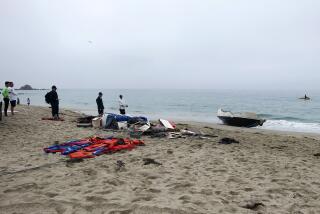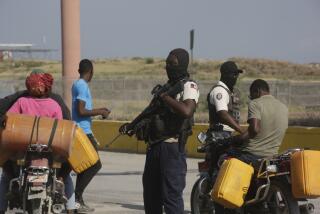200 Haitians Held After Fleeing Ship
MIAMI — An estimated 200 illegal immigrants from Haiti, and reportedly three Cubans, leaped into the water and swam and waded en masse onto a busy Miami causeway Tuesday after the wooden freighter on which they had ridden to America ran aground offshore, officials said.
“Once we arrived on the scene, they started jumping overboard,” said Coast Guard Petty Officer Ryan Doss aboard the cutter Maui. “As soon as that happened, we changed from law-enforcement mode to search-and-rescue mode and started pulling people from the water.”
It was believed to be the largest number of illegal Haitian arrivals in Florida in nearly three years. After their 50-foot coastal freighter grounded about 200 yards offshore, passengers leaped into the waters of Biscayne Bay and swarmed onto Rickenbacker Causeway, the busy six-lane highway linking Miami with the ritzy seaside community of Key Biscayne.
The Haitian craft also picked up three Cubans on a raft along the way to Florida, said North Miami Mayor Joe Celestin, a Haitian American who went to the scene and spoke with some of the migrants.
“It’s very sad to see the way human beings who are fleeing their country for a better way of life are treated,” Celestin said. “The Cubans that were on the same boat will be released. The Haitians will probably be deported. It’s a double standard.”
TV news cameras in helicopters showed the Haitians trying to flag down cars and pleading with drivers to stop, while others clambered onto the back of a pickup truck.
“They never actually made land,” said Det. Joey Giordano of the Miami-Dade Police Department. “They couldn’t get off the bridge on either side, and we shut it down immediately. The causeway was closed on both sides, and they [police] are making a car-by-car search to see if there are any Haitians inside.”
Dozens of Haitians were detained along the causeway by Miami police officers and made to sit on the roadside. Their hands were fastened together with plastic handcuffs.
Aboard the wooden boat, Haitians handed children to people already in the water. Coast Guard personnel, who arrived about 3:30 p.m. EST, pulled struggling men and women aboard their vessels and threw life preservers to others floundering in water 4 to 5 feet deep.
As dusk fell, 11 Coast Guard vessels, a helicopter and a fixed-wing aircraft were searching the waters south of the causeway for any remaining people, said Coast Guard Petty Officer Anastasia Burns. She added that at least 20 of the freighter’s passengers already had been rescued.
“We don’t know how many people were on board initially,” Burns said. “It was close to 200, but we don’t have an exact count. There still may be people in the water.
“As soon as they hit land, that’s when they were able to start jumping off. Unfortunately, they were still about 200 yards out, so they had to wade.”
Coast Guard officials said the rescued and detained Haitians would be turned over to the U.S. Immigration and Naturalization Service, which would determine whether they would be repatriated or allowed to stay in the U.S. The Border Patrol said it had dispatched agents to the scene to interview the arrivals once they had been determined to be safe and uninjured.
The televised drama of the Haitians’ desperate bid to reach the United States seemed certain to revive debate about their treatment under current federal law. Unlike Cuban rafters who make it to Florida’s shores and are allowed entry, Haitians customarily are detained and then fail in their bid to win asylum status. They then are sent back to their homeland, the poorest nation in the Western Hemisphere.
Phillip Brutus, a Haitian American who is a Democratic member of the Florida House of Representatives, called such differing treatment “ugly,” and he appealed for lawyers to take up the cause of the Haitians who landed Tuesday.
Some human-rights advocates have accused the Bush administration of racism, since the Haitians -- unlike the Cubans -- invariably are black. In March, immigration attorneys filed suit against the government’s policy on that basis.
Also unlike Haitian Americans, others note, Cuban Americans are a politically strong, well-to-do and long-established community in South Florida.
In December, a ship carrying 187 Haitian migrants ran aground off Elliott Key, south of Miami. Most of those passengers still are being held by the INS.
According to Burns, the Coast Guard last year rescued 1,400 Haitians, mainly in waters around Florida.
More to Read
Sign up for Essential California
The most important California stories and recommendations in your inbox every morning.
You may occasionally receive promotional content from the Los Angeles Times.









